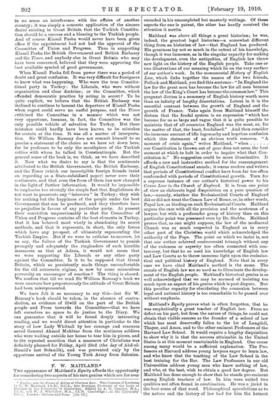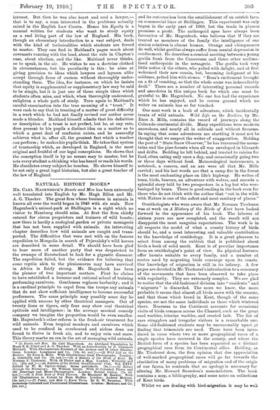F. W. MAITLAND.*
THE appearance of Maitland's Equity affords the opportunity for considering two aspects of his rare genius which are for ever Equity; also the Forms of Action at Common Law. Two Courses of Lectures by F. W. Maitland, LL.D., D.C.L., late Downing Professor of the Laws of Englind in the 'University of Cambridge._ Edited 'hy A, H. Chaykkr;
and W. J. Whittalter, LL:B. Cambridge : Bluvernity Preis. London : Stevens and Sons. [12s. 6(1.]
recorded in his uncompleted but masterly writings. Of these aspects the one is patent, the other has hardly received the attention it merits.
Maitland was above all things a great historian; he was, indeed, the greatest legal historian—a somewhat different thing from an historian of law—that England has produced. His greatness lay not so much in the extent of his knowledge, though it was immense, as in the singular capacity for making the development, even the antiquities, of English law throw new light on the history of the English people. Take one or two illustrations of our meaning which lie on the very surface of our author's work. In the monumental History of English Law, which links together the names of the two friends, Pollock and Maitland, you find this sentence : " In England the law for the great men has become the law for all men because the law of the King's Court has become the common law." This pregnant dictum is a summary of English history worth more than an infinity of lengthy dissertations. Latent in it is the essential contrast between the growth of England and the growth of France. Take again from Maitland himself the dictum that the feudal system is an expression "which has become for us so large and vague that it is quite possible to maintain that of all countries England was the most, or, for the matter of that, the least, fendalised." And then consider the immense amount of idle logomachy and hopeless confusion which this statement of an obvious truth removes. "A moment of crisis again," writes Maitland, " when our Constitution is thrown out of gear does not seem the best moment at which to halt in order to inquire what that Con- stitution is." No suggestion could be more illuminative. It affords a new and instructive method for the rearrangement of English Constitutional annals ; it warns readers and writers that periods of Constitutional conflict have been far too often confounded with periods of Constitutional growth. Turn for a supreme instance of our author's historical power to his Canon Law in the Church of England. It is from one point of view an elaborate legal disquisition on a pure question of law,—namely, whether the Ecclesiastical Courts of England did or did not treat the Canon Law of Rome, or, in other words, Papal law, as binding on such Ecclesiastical Courts. Maitland argues the case with all the precision and the acuteness of a lawyer, but with a profounder grasp of history than on this particular point was possessed even by Dr. Stubbs. Maitland proves that, as one might suppose, the law of the mediaeval Church was as much respected in England as in every other part of the Christian world which acknowledged the authority of the Pope. The point on which we insist is, not that our author achieved controversial triumph without any of the rudeness or asperity too often connected with con- troversy, but that he so used his knowledge of English law and Law Courts as to throw immense light upon the ecclesias- tical and political history of England. Note that in every case we have cited Maitland's method is the same. The annals of English law are so used as to illuminate the develop- ment of the English people. Maitland's historical genius is so well acknowledged that we may be accused of insisting too much upon an aspect of his genius which is past dispute. But this peculiar capacity for elucidating the connexion between legal and national history is too remarkable to be passed over without emphasis.
Maitland's Equity proves what is often forgotten, that he was emphatically a great teacher of English law. From no defect on his part, but from the nature of things, he could not obtain that visible success as the founder of a school of law which has most deservedly fallen to the lot of Langdell, Thayer, and Ames, and to the other eminent Professors of the Harvard Law School. It would require a lengthy disquisition to show why it is that the success attainable in the United States is at this moment unattainable in England. One cause among many would be a sufficient explanation. The Pro- fessors at Harvard address young lawyers eager to learn law, and who know that the teaching of the Law School is the best training for the Bar. The Law Professors in our old Universities address young men who know nothing of law, and who, at the best, wish to obtain a good law degree. But Maitland has done enough to show that he stands pre-eminent among English teachers of law. In him were united two qualities not often found in combination. He was a jurist in the best sense of that word. Philosophical speculations as to the nature and the history of law had for him the keenest
interest. But then he was also heart and soul a lawyer,— that is to say, a man interested in the problems actually raised in the English Law Courts. Hence his Equity is a manual written for students who want to study equity as a real living part of the law of England. His book, though an elementary introduction to a vast subject, deals with the kind of technicalities which students are forced to master. They can find in Maitland's pages much about covenants running with the land, about the mile in Clayton's case, about election, and the like. Maitland never thinks, so to speak, in the air. He wishes to see a doctrine clothed in circumstances, but his peculiarity is this : he aims at giving precision to ideas which lawyers and laymen alike accept through force of custom without thoroughly under- standing them. The idea, for instance, on which he insists that equity is supplemental or supplementary law may be said to be simple, but it is just one of those simple ideas which students often miss, and which, when thoroughly understood, enlighten a whole path of study. Turn again to Maitland's careful examination into the true meaning of a " trust." It were rash to say that in treating of a matter of great difficulty in a work which he had not finally revised our author never made a blunder. Maitland himself admits that his definition or description of a trust is not perfect, but he, at any rate, does present to his pupils a distinct idea on a matter as to which a great deal of confusion exists, and he assuredly achieves what is, after all, the greatest feat which a teacher can perform ; he makes his pupils think. He takes that system of trusteeship which, as developed in England, is the most original and fruitful of our legal conceptions. He shows that the conception itself is by no means easy to master, but he sets every student a-thinking who has heard or reads his words. He elucidates every subject he touches. He shows himself to be not only a great legal historian, but also a great teacher of the law of England.









































 Previous page
Previous page